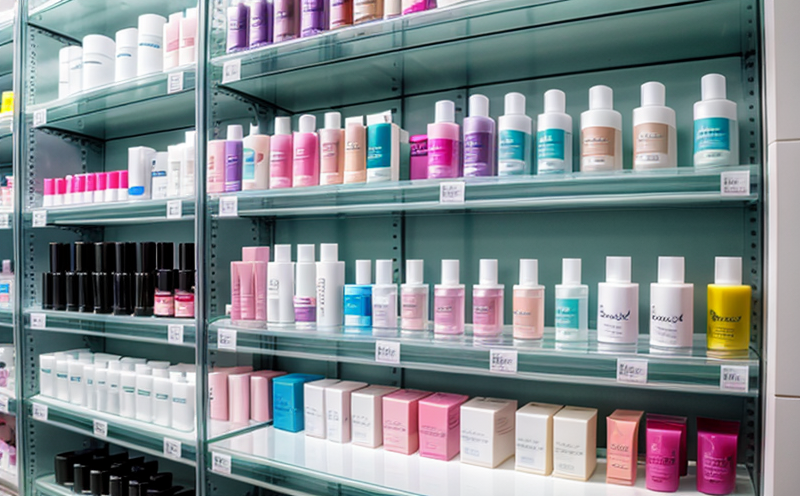Container Closure Integrity Testing in Cosmetics
Container closure integrity testing is a critical step in ensuring that cosmetic products meet regulatory standards and consumer expectations. This process involves assessing the ability of containers to protect the product inside, preventing contamination, leakage, or loss of active ingredients over time. The primary goal is to ensure that the container remains intact throughout the shelf life of the product.
In the cosmetics industry, where product integrity can significantly impact consumer safety and satisfaction, this testing is especially important. It helps manufacturers detect defects in packaging early on, ensuring that only high-quality products reach the market. This not only enhances brand reputation but also contributes to customer trust and loyalty.
Container closure integrity testing typically involves subjecting containers to various stresses such as pressure, temperature cycling, and humidity exposure. These tests simulate real-world conditions that a product might encounter during storage and transportation. By identifying potential weaknesses early in the development process, companies can make necessary adjustments before mass production begins.
One of the key challenges in container closure integrity testing is maintaining accurate results across different types of containers used for cosmetics, which range from plastic bottles to metal tubes. Each type has unique properties that must be accounted for during testing. For instance, while pressure tests may effectively identify flaws in glass jars, they would not be suitable for assessing the seal quality of aerosol cans.
Another important aspect is ensuring compatibility between the container and its contents. Many cosmetic products contain volatile ingredients or have specific pH levels that can interact with certain materials. Therefore, it's crucial to select appropriate testing methods that do not alter these characteristics. This ensures that both the container and the product maintain their integrity throughout the shelf life.
Regulatory bodies such as the FDA (Food and Drug Administration) in the United States and EMA (European Medicines Agency) provide guidelines on how to conduct these tests correctly. These standards emphasize not only the mechanical strength of the container but also its ability to preserve the product's quality over time.
By incorporating advanced instrumentation and techniques, laboratories can achieve highly accurate results that meet international standards like ISO 11607-2 for barrier properties testing or ASTM F2335 for pressure decay testing. These methods provide detailed insights into the performance of container closures under various stress conditions.
In summary, container closure integrity testing is essential in the cosmetics industry to ensure product safety and efficacy. It plays a vital role in maintaining brand reputation and customer satisfaction by preventing defects that could compromise product quality. With careful attention to detail during testing, manufacturers can produce reliable products that meet both regulatory requirements and consumer expectations.
Why It Matters
Container closure integrity is paramount in the cosmetics industry due to its direct impact on product quality and safety. Ensuring that containers remain intact throughout the shelf life helps prevent contamination, leakage, and loss of active ingredients, which are critical for maintaining a consistent product experience.
- Avoids Contamination: Defective closures can allow external contaminants to enter the container, potentially leading to health risks if ingested or applied directly onto skin. This is especially concerning given the sensitive nature of some cosmetic ingredients.
- Maintains Product Integrity: Properly sealed containers help preserve the product's quality by preventing evaporation, oxidation, and degradation caused by environmental factors such as light, heat, and moisture. This ensures that consumers receive a consistent product experience at any point during its shelf life.
- Enhances Brand Reputation: Reliable container closure integrity contributes significantly to brand reputation and customer trust. Consumers expect high-quality products that are safe and effective, and manufacturers who prioritize these aspects build lasting relationships with their customers.
In addition to these benefits, implementing robust testing protocols also aids in compliance with international standards and regulations, ensuring that products meet stringent quality benchmarks. This not only protects consumers but also supports the overall sustainability of the industry by reducing waste associated with defective packaging.
Customer Impact and Satisfaction
The impact of container closure integrity testing extends far beyond just ensuring compliance with regulations. It has a direct effect on customer satisfaction by delivering products that are safe, effective, and consistent in quality.
- Enhanced Safety: By preventing contaminants from entering the product, manufacturers can safeguard consumers against potential health hazards.
- Better Product Performance: Maintaining container integrity ensures that active ingredients remain stable over time, delivering consistent results every time a consumer uses the product.
- Increased Customer Trust: When customers know their products are rigorously tested and meet high standards, they are more likely to trust the brand and continue purchasing from it.
Use Cases and Application Examples
Container closure integrity testing is applicable across various cosmetic product types including creams, lotions, serums, and makeup bases. Each type presents unique challenges that require tailored testing approaches.
- Creams: These products often contain emulsifiers which can interact with packaging materials. Testing focuses on ensuring the container seals tightly to prevent product separation or evaporation.
- Lotions: Lotions tend to have higher water content, making them more susceptible to microbial growth if not properly sealed. Tests focus on preventing leaks and maintaining hygiene standards.
- Serums: Highly concentrated with active ingredients, serums require particularly robust containers to avoid degradation or loss of effectiveness due to exposure to air or light.
- Makeup Bases: These products are subject to frequent handling and potential contamination. Testing ensures that the container provides adequate protection against these risks.





